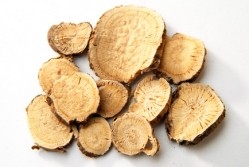Revealed: How Traditional Chinese Medicine plant compounds kill cancer cells

Compound kushen injection (CKI) is approved for use in China to treat various cancer tumours, usually as an adjunct to western chemotherapy – but how it works has not been known.
This study, published in the journal Oncotarget, is one of the first to characterise the molecular action of a Traditional Chinese Medicine rather than breaking it down to its constituent parts.
“Most Traditional Chinese Medicine are based on hundreds or thousands of years of experience with their use in China,” said study leader, Professor David Adelson, director of the Zhendong Australia – China Centre for the Molecular Basis of Traditional Chinese Medicine.
“There is often plenty of evidence that these medicines have a therapeutic benefit, but there isn’t the understanding of how or why.
“If we broke down and tested the components of many Traditional Chinese Medicines, we would find that individual compounds don’t have much activity on their own. It’s the combination of compounds which can be effective, and potentially means few side-effects as well.”
This is one of the first studies to show the molecular mode of action of a complex mixture of plant-based compounds – in this case extracts from the roots of two medicinal herbs, Kushen and Baituling – by applying a systems biology approach to take into account all measurable aspects of the system rather than focussing on a single variable.
Cancer cells
The researchers used high-throughput next generation sequencing technologies to identify genes and biological pathways targeted by CKI when applied to breast cancer cells grown in the laboratory.
The study showed that the patterns of gene expression triggered by CKI affect the same pathways as western chemotherapy but by acting on different genes in the same pathways.
“Cells were treated with CKI for 24 and 48 hours at two concentrations (1 and 2 mg/mL total alkaloids), and the effect of CKI on cell proliferation and apoptosis were measured using XTT and Annexin V/Propidium Iodide staining assays respectively. Transcriptome data of cells treated with CKI or 5-Fluorouracil (5-FU) for 24 and 48 hours were subsequently acquired using high-throughput Illumina RNA-seq technology. In this report we show that CKI inhibited MCF-7 cell proliferation and induced apoptosis in a dose-dependent fashion,” states the study.
Professor Adelson expalined: “These genes regulate the cell cycle of division and death, and it seems that CKI alters the way the cell cycle is regulated to push cancer cells down the cell death pathway, therefore killing the cells.”
He said this technique could be used to analyse the molecular mechanisms of other Traditional Chinese Medicines, potentially opening their way for use in western medicine.
“We not only identified potential gene targets of CKI based on differential gene expression, but also characterised potential biological pathways targeted by CKI. Although further experiments are required to validate these candidate targets, our results provide a very important starting point for subsequent experimental functional validation,” the study stated.
The Zhendong Australia China Centre for Molecular Traditional Chinese Medicine was established at the University of Adelaide in 2012 in a collaboration with the China-based Shanxi College of Traditional Chinese Medicine and Zhendong Pharmaceutical Company.
Source: Oncotarget
“Identification of candidate anti-cancer molecular mechanisms of compound kushen injection using functional genomics”
September 1, 2016. DOI: 10.18632/oncotarget.11788
Authors: David Adelson, et al















